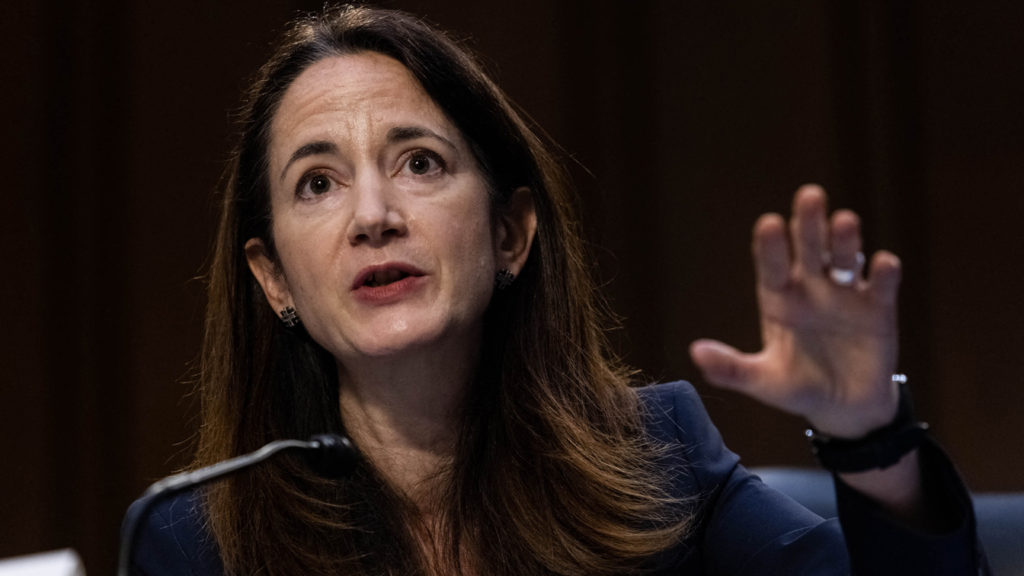[ad_1]
WASHINGTON — President Biden’s top intelligence chiefs have yet to determine how people first became infected with COVID-19, but they say they haven’t ruled out the possibility that it escaped from a lab in Wuhan, China.
“It is absolutely accurate that the intelligence community does not know exactly where, when or how the COVID-19 virus was transmitted initially,” Director of National Intelligence Avril Haines told lawmakers Wednesday during a Senate Intelligence Committee hearing.
“Basically, components have coalesced around two alternative theories. These scenarios are, it emerged naturally from human contact with infected animals or it was a laboratory accident,” she said in response to a question from the committee’s vice chair, Sen. Marco Rubio, R-Fla.
Avril Haines, director of the Office of the Director of National Intelligence. (Graeme Jennings/AFP via Getty Images)
“That is where we are right now, but we’re continuing to work on this issue, and collect information, and do the best we can essentially to give you greater confidence in what that scenario is,” Haines said.
The possibility that Chinese scientists studying coronaviruses for public health purposes may have accidentally allowed a natural sample of the virus to escape the lab was a theory first raised during the Trump administration. President Donald Trump’s efforts to blame China for the spread of the virus, damaging and appearing racially and ideologically biased, led to the theory quickly becoming politicized. It was also conflated with an alternative theory, disproved by scientists and ruled out by the intelligence community, that the virus could have been a bioweapon.
Despite the controversy, the intelligence community has been weighing the possibility, even if scientifically unlikely, of a lab accident since last year. Haines’s testimony on Wednesday is the clearest and most public confirmation to date of the ongoing intelligence community investigation into this theory.
CIA Director William Burns, a former diplomat, said he agreed with Haines and also criticized Beijing for its lack of transparency.
Story continues
“The one thing that’s clear to us and to our analysts is that the Chinese leadership has not been fully forthcoming or fully transparent in working with the [World Health Organization] or in providing the kind of original complete data that would help answer those questions,” he said Wednesday. “We’re doing everything we can, using all the sources available to all of us on this panel, to try to get to the bottom of it.”
The intelligence community was first enlisted to help track the foreign response to the virus and its origins in the winter of 2019-20 amid concerns that Chinese officials were not forthcoming about the disease’s spread and not immediately receptive to foreign researchers, including from the WHO, traveling to Wuhan to help investigate. The U.S. intelligence community, relying on information collected from military communications channels, noticed that Chinese officials were discussing plans to make sure the government could function despite a crisis.
The Wuhan Institute of Virology. (Hector Retamal/AFP via Getty Images)
The Chinese government’s effort to stymie outside investigation is one reason the possibility of a lab accident is still being considered.
A number of scientists dispute or doubt the lab accident theory, but there is a growing consensus around the need for a more detailed investigation into the origins of the pandemic in order to prevent the next outbreak.
A group of scientists and skeptics published a letter in the New York Times on April 7 demanding “further inquiries” into the pandemic’s origins, criticizing the lack of a “robust process” for investigation, which could inhibit “future pandemic prevention and response strategies.”
While former senior Trump administration officials have discussed the lab accident theory publicly on several occasions, Biden’s own top advisers, including national security adviser Jake Sullivan, have also criticized the WHO’s investigation into the origins of the pandemic.
If COVID-19 did escape from a lab, it would likely be impossible to prove absent a whistleblower from China coming forward, or some other form of proof from those aware of or involved in the accident. Over a year after the first reported cases of COVID-19, it may be impossible to obtain those kinds of details.
However, answering as many of those questions as possible will be important in determining what to focus on to prevent the next pandemic, from increasing standards of lab safety to more quickly sharing information about initial cases.
According to the intelligence community’s recently published global trends report, the threat of disease and pandemics will continue into the future. “We need to expect the unexpected,” the report says, “and apply the lessons of this pandemic to our craft in the future.”
____
Read more from Yahoo News:
[ad_2]
Source link
